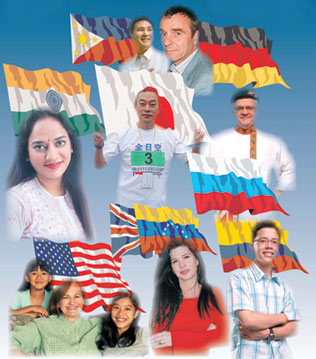They come from eight different countries but have one thing in
common: A love for China.
Their understanding of the country is profound; their
commitment, uplifting; their vision, inspiring; and passion,
contagious.
And they moved many as they articulated why they deserve to be
the eight foreigners privileged to carry the Olympic torch in
China.
Yesterday, they were unveiled by computer maker Lenovo as the
eight expats nominated after a month-long online campaign.
Applicants were asked to submit a profile justifying their
candidacy, then frogmarched through a public online vote. After
that, a selection panel made up of Lenovo Group officials and
China Daily executives had the final say.
In a bid to restrict the winners to one per country, and keep
the program as cosmopolitan as possible, two Americans were axed
from the final list despite garnering enough votes to secure a
place.
The eight foreign residents who will each carry the torch for
200 meters on Chinese soil next year are, in order of winning
votes: Jenny Bowen of the US, Marcos Torres of the Philippines,
Werner Ebel of Germany, Meena Barot of India, Yoshitoshi Mizuya of
Japan, Luis Hong-Sanchez of Colombia, Yury Ilyakhin of Russia and
British-Venezuelan Deirdre Smyth.
The campaign was organized by Lenovo Group, the worldwide
partner of the Olympic torch relay, with the help of China
Daily, the country's only national English-language
newspaper.
Some 262 people from 47 countries and regions vied for the eight
available slots and another 245,000 voted with their mouse.
Altogether, 1.5 million people comprising 156 nationalities visited
the campaign webpage.
Applicants, votes and comments poured in from all around the
world after the online campaign began on September 7, said Alice
Li, vice-president, Olympic Marketing of Lenovo.
"This demonstration of enthusiasm, creativity and sense of
international community is consistent with the Olympic spirit,
which cherishes the participation and unification of different
cultures and peoples," she said. "It greatly helped Lenovo increase
its brand influence."
The winners were chosen by a vote, but in order to be
shortlisted they had to demonstrate their appreciation of Chinese
culture and history and their devotion to communicating information
about "the real China" to the rest of the world.
The oldest contestant was 88-year-old Eleanor Liu and the
youngest was four-year-old Serena Gao. Both were born in the United
States.
Although Gao ranked sixth according to the number of votes, she
was disqualified for not meeting the minimum age requirement of
14.
Many prominent political figures, including the ambassadors of
Greece and the Seychelles, could not make it to the final eight, as
did leading business figures like the presidents of Bayer
Healthcare and Chang'an Ford Mazda Automobile Co.
In the campaign, as in the Olympics, contestants entered a very
level playing field and performed according to their own merit.
In addition to the required campaign stories, themed "China and
I", which were published on the China Daily website along
with the candidates' photos, some applicants engaged a variety of
mass media to promote themselves.
Some cooperated with newspapers, television and radio station in
China or in their home country to solicit votes, others opted for
personal blogs.
Some formed groups on popular social networking websites like
FaceBook, while others uploaded campaign videos on websites like
Youtube.
The organizers of the Beijing Olympic Games began recruiting 21,880
torchbearers from around the world on June 23 through various
organizations and entities.
Exactly 19,400 people will be picked to run in China.
(China Daily November 2, 2007)


